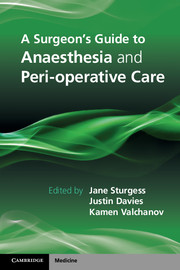Book contents
- Frontmatter
- Contents
- List of contributors
- Foreword
- Section I Basic sciences
- Section II Anaesthesia and peri-operative care for surgical specialties
- Chapter 7 Cardiothoracic cases
- Chapter 8 Colorectal cases
- Chapter 9 Upper gastrointestinal cases
- Chapter 10 Hepatobiliary and pancreatic cases
- Chapter 11 Endocrine cases
- Chapter 12 Vascular cases
- Chapter 13 Organ transplant cases
- Chapter 14 Otorhinology, head and neck cases
- Chapter 15 Paediatric cases
- Chapter 16 Plastic, reconstructive and cosmetic cases
- Chapter 17 Neurosurgery cases
- Chapter 18 Trauma cases
- Chapter 19 Orthopaedic cases
- Chapter 20 Urology cases
- Chapter 21 Bariatric cases
- Section III At a glance
- List of abbreviations
- Index
- References
Chapter 21 - Bariatric cases
Published online by Cambridge University Press: 05 July 2014
- Frontmatter
- Contents
- List of contributors
- Foreword
- Section I Basic sciences
- Section II Anaesthesia and peri-operative care for surgical specialties
- Chapter 7 Cardiothoracic cases
- Chapter 8 Colorectal cases
- Chapter 9 Upper gastrointestinal cases
- Chapter 10 Hepatobiliary and pancreatic cases
- Chapter 11 Endocrine cases
- Chapter 12 Vascular cases
- Chapter 13 Organ transplant cases
- Chapter 14 Otorhinology, head and neck cases
- Chapter 15 Paediatric cases
- Chapter 16 Plastic, reconstructive and cosmetic cases
- Chapter 17 Neurosurgery cases
- Chapter 18 Trauma cases
- Chapter 19 Orthopaedic cases
- Chapter 20 Urology cases
- Chapter 21 Bariatric cases
- Section III At a glance
- List of abbreviations
- Index
- References
Summary
Introduction
The words ‘obesity’ and ‘bariatric’ are not found in the current surgical syllabus. The terms are sometimes used interchangeably, but obesity is generic, whereas bariatric is generally held to refer to weight-loss surgery.
Obesity, and specifically morbid obesity, is endemic in our population and morbidly obese patients undergo many types of surgical procedures. The greatest experience of managing the morbidly obese patient peri-operatively is among those surgeons and anaesthetists regularly performing bariatric operations. This chapter is written by consultants with a special interest in bariatric surgery, but the following comments and learning points are applicable to any obese patient, undergoing any type of surgery.
Anaesthesia, obesity and bariatric surgery
Although lagging behind the US, Britain is the ‘fat man’of Europe, with over 25% of adults having a BMI of >30. The relentless rise in the prevalence of obesity over recent years has placed a significant health and cost burden on our health system. Bariatric surgery has become the recognised treatment of choice for morbid obesity worldwide, with some 10,000 surgical procedures performed each year in the UK. However, there are hundreds of thousands of non-bariatric surgical procedures performed on morbidly obese patients, and these patients are a high-risk surgical group, that all doctors will have to deal with.
Morbid obesity shortens life span by 8–10 years. Mortality ratio increases with increasing BMI because of the increased risks of disease states that are associated with obesity (diabetes, hypertension, dyslipidaemia, sleep apnoea, many cancers).
- Type
- Chapter
- Information
- A Surgeon's Guide to Anaesthesia and Peri-operative Care , pp. 246 - 258Publisher: Cambridge University PressPrint publication year: 2014



